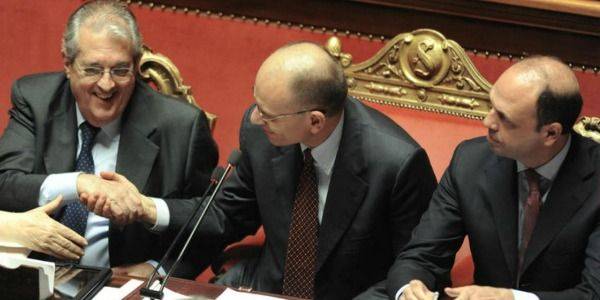Stability Bill a Spanner in the Works
ROME - To mix a metaphor or two, just when Premier Enrico Letta's government seemed to have a green light, a spanner was tossed into the works, with consequences that are anyone's guess. The spanner is the budget bill for 2014, hammered together in late evening sessions this week by Letta of the center-left Partito Democratico (PD) and his governing coalition partner Angelino Alfano of the Berlusconi party, which, incidentally, is called either Partito della Liberta' (PdL) or Forza Italia or, increasingly, both, depending upon the day. Supposedly this draft budget, which went before the Chamber of Deputies this week but is still a long way from final approval, is meant to achieve two related goals: to reduce the pressure on tax payers while also stimulating the economy.
Beginning with the tax reductions, it came for many as good news that the government plans to exclude any cuts from Italy's national health system budget. The main effort in the draft bill, is, as the PdL-Forza Italia has demanded, removal of the hated property tax on first homes, called the "IMU." This will indeed be lopped off, if and when the bill passes--but then the law would incorporate a new tax on services provided by the cities and towns, to be based upon the size of the home in square meters. The proposed new services tax, to be called the "Trise," is being attacked from both left and right on grounds that it amounts to a change in name only. In addition, because the IMU on first homes is being dropped, the IMU on second homes owned for vacations or investment is doomed to rise. Fallout from this predictable tax hike is already visible; in townships like Ronciglione, outside Rome, where many Romans owned small weekend apartments, the entire town seems for sale.
In addition, the Letta-Alfano 90-page budget bill, called the "Stability Law," most likely will be just that, in the sense that some predict the quarrels over it will go on for the next two months, and end with little accomplished on the concrete level. As evidence of how things actually work, as opposed to rhetoric, the financial daily Il Sole/24 Ore reminds us that, in order to activate the laws passed by the former government headed by economist Mario Monti, Parliament was required to pass 725 norms, but only 256 were enacted. The remaining two-thirds are still on paper.
"The heart of the bill will be an intervention to reduce taxes on workers and increase the money in their pay packet," said Letta, speaking on TV. The idea is that giving workers more money will promote consumer spending and hence stimulate the troubled Italian economy ("to relaunch growth" is the going phrase) But in point of fact industrial and white collar workers are to have only a modest pay increase, estimated on the average as from $13 to $18--not enough, critics say, to relaunch much of anything except angst.
The president of the Finance Commission at the Chamber of Deputies, Daniele Capezzone, who is also a spokesman for the PdL-Forza Italia, was among those critics who spoke of "disappointment" in a budget bill that it is "minimalist and inadequate." For Capezzone, the bill fails to reduce expenditures in any serious way and in so doing renounces cutting taxes. "The stimulus package is, to put it mildly, distressing [because] the new tax on property will affect one's main residence, plus rental property that is not occupied and rented property as well."
Even the national association of manufacturers, Confindustria, found objections, although there will be a reduction in a tax called IRAP on the component relative to the cost of labor and a reduction in social contributions. On the left, the trade unionists opposing the budget bill had vociferous objections and have already called for a massive demonstration in Rome this Friday, while also threatening a general strike.
It came as a stunning surprise Thursday evening when former Premier Mario Monti, founder of Scelta Civica only seven months ago, resigned from that party over its support of the budget bill. Monti, a lifetime senator, is rigidly opposed to the Letta-Alfano bill and joins the Mixed Group of senators Friday.





































i-Italy
Facebook
Google+
This work may not be reproduced, in whole or in part, without prior written permission.
Questo lavoro non può essere riprodotto, in tutto o in parte, senza permesso scritto.